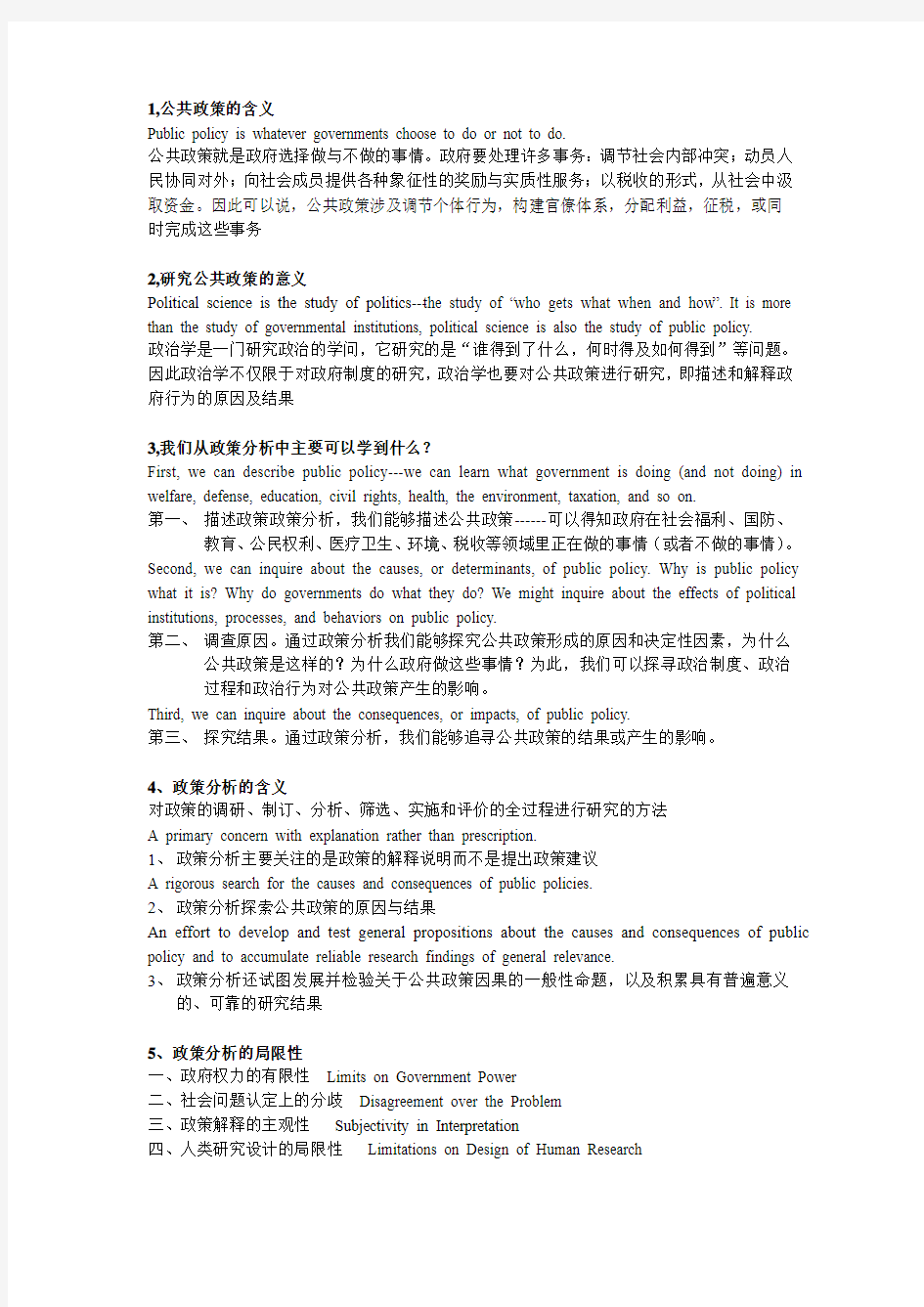
公共政策期末考试
- 格式:doc
- 大小:303.00 KB
- 文档页数:6


1,公共政策的含义
Public policy is whatever governments choose to do or not to do.
公共政策就是政府选择做与不做的事情。政府要处理许多事务:调节社会内部冲突;动员人民协同对外;向社会成员提供各种象征性的奖励与实质性服务;以税收的形式,从社会中汲取资金。因此可以说,公共政策涉及调节个体行为,构建官僚体系,分配利益,征税,或同时完成这些事务
2,研究公共政策的意义
Political science is the study of politics---the study of “who gets what when and how”. It is more than the study of governmental institutions, political science is also the study of public policy.
政治学是一门研究政治的学问,它研究的是“谁得到了什么,何时得及如何得到”等问题。因此政治学不仅限于对政府制度的研究,政治学也要对公共政策进行研究,即描述和解释政府行为的原因及结果
3,我们从政策分析中主要可以学到什么?
First, we can describe public policy---we can learn what government is doing (and not doing) in welfare, defense, education, civil rights, health, the environment, taxation, and so on.
第一、描述政策政策分析,我们能够描述公共政策------可以得知政府在社会福利、国防、教育、公民权利、医疗卫生、环境、税收等领域里正在做的事情(或者不做的事情)。Second, we can inquire about the causes, or determinants, of public policy. Why is public policy what it is? Why do governments do what they do? We might inquire about the effects of political institutions, processes, and behaviors on public policy.
第二、调查原因。通过政策分析我们能够探究公共政策形成的原因和决定性因素,为什么公共政策是这样的?为什么政府做这些事情?为此,我们可以探寻政治制度、政治过程和政治行为对公共政策产生的影响。
Third, we can inquire about the consequences, or impacts, of public policy.
第三、探究结果。通过政策分析,我们能够追寻公共政策的结果或产生的影响。
4、政策分析的含义
对政策的调研、制订、分析、筛选、实施和评价的全过程进行研究的方法
A primary concern with explanation rather than prescription.
1、政策分析主要关注的是政策的解释说明而不是提出政策建议
A rigorous search for the causes and consequences of public policies.
2、政策分析探索公共政策的原因与结果
An effort to develop and test general propositions about the causes and consequences of public policy and to accumulate reliable research findings of general relevance.
3、政策分析还试图发展并检验关于公共政策因果的一般性命题,以及积累具有普遍意义
的、可靠的研究结果
5、政策分析的局限性
一、政府权力的有限性Limits on Government Power
二、社会问题认定上的分歧Disagreement over the Problem
三、政策解释的主观性Subjectivity in Interpretation
四、人类研究设计的局限性Limitations on Design of Human Research
五、人类行为的复杂性Complexity of Human Behavior
6、政策分析模型的主要作用
一、Simplify and clarify our thinking about politics and public policy
简化并澄清我们对政治和公共政策的思考
二、Identify important aspects of policy problems
识别政策问题的重要方面
三、Help us communicate with each other by focusing on essential features of political life
通过关注政治生活的主要特征,促进我们相互之间的沟通
四、Direct our efforts to understand public policy better by suggesting what is important
and what is unimportant
指导我们更好地理解公共政策鉴别重要与不重要的方面
五、Suggest explanations for public policy and predict its consequences
解释公共政策并预测其结果
7、八大公共政策分析模型的名称及其核心观点
一、制度主义模型Institutional model
政策是制度的输出policy as institutional output
二、过程模型Process model
政策是政治活动policy as political activity
三、理性主义模型Rational model
政策是社会效益的最大化policy as maximum social gain
四、渐进主义模型Incremental model
政策是过去政策的补充和修正policy as variations on the past
五、团体理论模型Group model
政策是团体利益的平衡policy as group equilibrium
六、精英模型Elite model
政策是精英的价值偏好policy as elite preference
七、公共选择模型Public choice model
政策是自利个人的群体选择policy as collective decision making by self-interested individuals 八、博弈论模型Game theory model
政策是竞争状态下的理性选择policy as rational choice in competitive situations
8、公共政策国过程的六个主要阶段
Problem identification -------Agenda setting -------Policy formulation
-------Policy legitimation -----Policy implementation----Policy evaluation